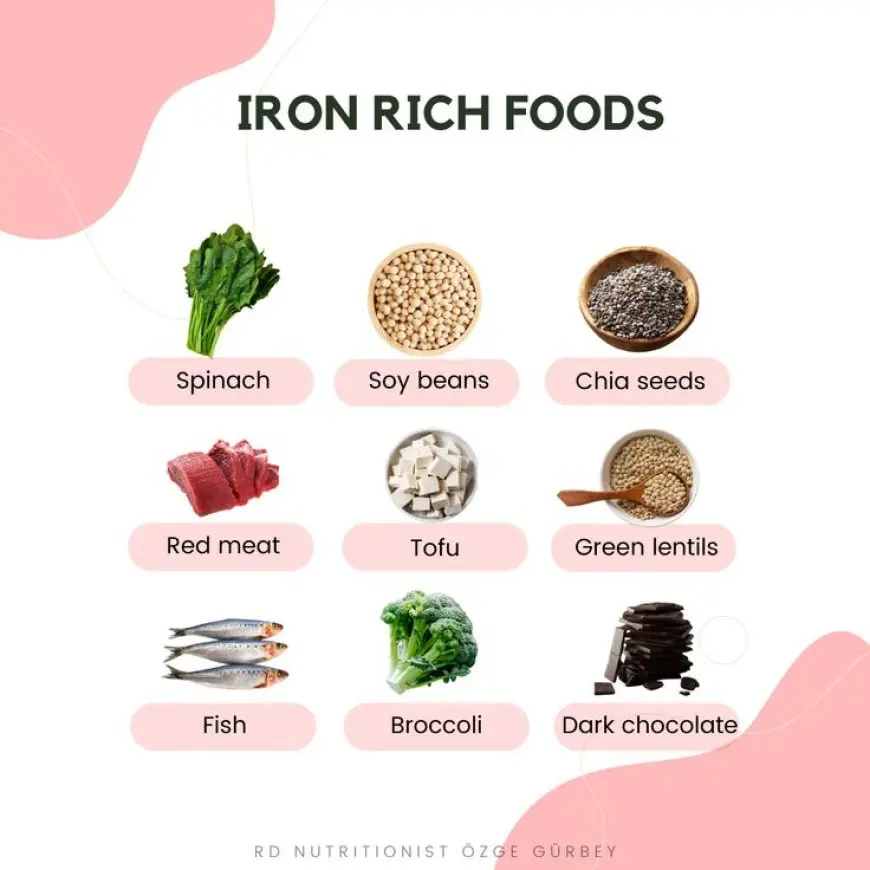Top Iron-Rich Foods for Women’s Health
Top Iron-Rich Foods for Women’s Health

Iron is a crucial mineral for women's health, playing an essential role in the production of hemoglobin, which helps carry oxygen through the blood. A deficiency in iron can lead to fatigue, weakness, and anemia, particularly in women of reproductive age. Women require more iron than men, especially during menstruation, pregnancy, and lactation. Fortunately, many iron-rich foods can be incorporated into your diet to meet these needs.
Lean Red Meat
Lean cuts of red meat, such as beef and lamb, are among the best sources of heme iron, the type of iron most easily absorbed by the body. Heme iron is found only in animal products, making red meat an excellent choice for boosting iron levels. Consuming a small portion of lean red meat a few times a week can significantly contribute to iron intake.
Spinach and Leafy Greens
Spinach, kale, and other dark leafy greens are excellent sources of non-heme iron, the type of iron found in plant-based foods. Although non-heme iron is not as easily absorbed as heme iron, consuming these vegetables regularly can still help boost iron levels. Additionally, pairing them with foods rich in vitamin C, such as citrus fruits or bell peppers, can enhance iron absorption.
Legumes and Beans
Legumes, including lentils, chickpeas, and beans, are excellent plant-based sources of iron. They are also high in fiber and protein, making them great additions to a balanced diet. A variety of beans, including black beans, kidney beans, and pinto beans, can help increase iron intake, especially for vegetarians and vegans.
Tofu and Tempeh
Soy-based foods like tofu and tempeh are rich in non-heme iron, making them a valuable part of a plant-based diet. They are also great sources of protein and other essential nutrients, making them versatile additions to meals. Adding tofu or tempeh to stir-fries, salads, and soups can help boost your iron levels while providing other health benefits.
Quinoa and Whole Grains
Quinoa, along with other whole grains like oats, brown rice, and barley, contains significant amounts of iron. Whole grains are also rich in fiber, which supports digestive health. Including a variety of whole grains in your diet can help you meet your daily iron needs while providing sustained energy throughout the day.
Pumpkin Seeds and Nuts
Pumpkin seeds, cashews, and almonds are good sources of non-heme iron. These seeds and nuts also provide healthy fats, protein, and antioxidants, making them great snacks for boosting iron intake. Eating a handful of pumpkin seeds or nuts can help increase your iron levels while satisfying your hunger between meals.
Fortified Cereals
Many breakfast cereals are fortified with iron, making them a convenient and accessible option for boosting iron intake. Look for cereals that contain at least 18 mg of iron per serving, and pair them with a vitamin C-rich food like orange juice to improve absorption.
Dark Chocolate
Dark chocolate with a high cocoa content is not only a delicious treat but also a source of iron. It provides small amounts of both non-heme iron and antioxidants. Consuming dark chocolate in moderation can contribute to your overall iron intake while offering additional health benefits.
Eggs
Eggs, particularly the yolks, are a good source of iron. They contain small amounts of heme iron, which is easier for the body to absorb compared to non-heme iron. Eggs are versatile and can be included in a variety of dishes, from omelets to salads, making them an easy way to boost your iron intake.
Dried Fruits
Dried fruits such as apricots, raisins, and prunes are concentrated sources of iron. They also provide natural sugars, fiber, and other nutrients. A handful of dried fruit can be an easy and tasty snack to boost iron levels, especially when combined with a source of vitamin C to improve absorption.
Incorporating these iron-rich foods into your diet can help prevent iron deficiency and support overall health. Remember that some foods and drinks, such as coffee and tea, can inhibit iron absorption, so it's best to consume them separately from iron-rich meals.







